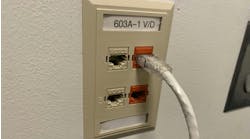As of mid-March, entire corporate campuses have shut down access, mandating employees to work from home. In addition, schools and universities have suspended classes, while conferences and face-to-face meetings have been postponed or canceled and long-term living facilities are prohibiting outside visitors. These measures have been implemented to stop the spread of the coronavirus, also known as COVID-19.
Moving forward, electrical contractors and engineering firms can do their part to prevent more cases of the virus in their communities. For example, on its website, the National Electrical Contractors Association (NECA) has set up a Coronavirus Resource Center. The association offers the following tips from the Occupational Safety and Health Administration (OSHA) to protect workers.
- Encourage your workers to perform frequent hand washing with soap and water for at least 20 seconds or use an alcohol-based hand rub with at least 60% alcohol. Also, they should avoid touching their eyes, nose, or mouth with unwashed hands and avoid close contact with those who are sick.
- Disinfect all surfaces that are touched regularly and use disposal cups.
- Set up hand washing and hand sanitizer stations. Also have tissues and trash cans readily available to prevent the spread of the virus.
- To meet OSHA regulations, contractors should consider developing an overall policy related to illness prevention and the spread of germs and illnesses such as the cold and the flu.
- Review company policies and contracts on sick leave, family medical care leave and other federal regulations protecting employer and employee rights.
As of March 13, OSHA stated COVID-19 can be a recordable illness “if a worker is infected as a result of performing their work-related duties.” Since the directive was geared more toward individuals working in environments such as hospitals, NECA worked directly with the U.S. Department of Labor to explain the impact of the directive on the electrical contracting industry. In turn, NECA contractors will not be required to list COVID-19 outbreaks on their OSHA 300 logs according to the recent update.
If a contractor has a worker who has been exposed to the virus, however, the company should do the following:
- If the worker is showing signs of exposure such as a fever or respiratory illness, he or she should stay at home and seek medical help from a licensed medical provider. In addition, he or she should avoid public gatherings, public transportation and public areas.
- The company should then evaluate the risk of exposure to other workers and ensure they use controls including physical barriers to control the risk of the virus, social distancing and appropriate personal protective equipment, hygiene and cleaning supplies.
- Contractors can also review the OSHA employer guide, “Guidance on Preparing Workplaces for COVID-19, OSHA Publication 3990” and an alert, “Prevent Worker Exposure to Coronavirus, (COVID-19), OSHA Publication 3989.
As the impact of the virus is rapidly evolving in the United States, electrical contractors can keep up to date on the virus by checking the OSHA website.
Fischbach is a freelance writer based in Overland Park, Kan. She can be reached at [email protected].



